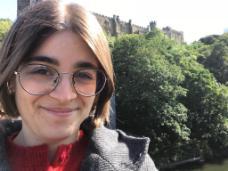Name: Marta Antola
Research:
Urban Temptations and Socratic Storytelling: The Athenian Odyssey of Plato’s Socrates
My doctoral thesis focuses on Charmides, Lysis, Euthydemus, Protagoras, and Republic, the five dialogues of Plato in which Socrates, leading character in most of Plato’s works, uniquely takes on the role of both first-person narrator and main character, with an aim to uncover what lies behind this peculiar usage of Socrates in these works.
Inspired by Plato’s attention to formal aspects of narrative from both a theoretical and a practical point of view, scholars who have approached this topic so far have chosen to dwell on these very formal aspects of the works forgoing to take into account the cultural and historical background in which Plato operated and the dialogues are set. Consequently, they failed to provide a satisfactory answer to the question on which my study is based.
In my research, I adopt a textual and linguistic, meta- and intertextual approach combined with a historicised and culture-specific focus to explore the issue. Plato’s reflections on the formal aspects of a work, his concern with poetry and traditional, and especially Athenian, education, and his very relation with the poetic tradition serve as a necessary premise and background for my overall argument. As I will show, wandering around Plato’s literary Athens, in the five dialogues Socrates is set to face the education that the polis and its teachers impart to youths and adults alike: its mimetic implications, terrible effects, and irresistible influence. Against such a scenario, to survive the polis and offer others a way to survive, Socrates adopts a most attractive and culture-specific way. Turning into a most skilled Odysseus, he enacts all sorts of Homeric Odyssean stratagems to counter the education in the polis and pursue and lead others to pursue philosophy. As such, telling stories that can be regarded as an innovative, Athenian Odyssey of philosophy, Socrates provides the way to resist the temptations in the polis and persuade his audience to lead the life most authentic for them.
In so doing, my thesis not only sheds light on a formal aspect of Plato’s production, opening new perspectives to explore Plato’s usage of Socrates and Plato’s works; it also provides an answer to an unsolved, fundamental moral problem that lies at the heart of Plato’s Republic (6.491b-499c) and, arguably, of Plato’s thought: how is it possible for virtuous men and philosophers to live and survive in a polis where corruption springs from the very sanctioned educators?
Recent papers/presentations given:
- ‘Plato’s Odyssean response to the Plato-Homer Question’, “Plato and Neoplatonism”, ISNS, Athens 10-12/06/2021.
- ‘A Fortnight with PHerc. 1388’, From Papyri to the Web: A Workshop on Papyrology and Palaeography in the Digital Age, Durham 20-21/03/2021. (Online Event)
- ‘A Study on Composition and Reception: ἄλλο προοίμιον of Plato’s Theaetetus’ (PBerol inv. 9782), “Culture and Society in Greek, Roman, and Byzantine Egypt”, SCS, Chicago 7-10/01/2021.
- ‘Plato’s Odyssean response to the Plato-Homer Question’, ISNS, Athens 10-14/06/2020. [Postponed to June 2021 due to COVID-19]
- ‘Some Considerations about PBerol inv. 9782: ἄλλο προοίμιον of Plato’s Theaetetus’, CA Annual Conference, Swansea 17-20/04/2020. [Cancelled due to COVID-19]
- ‘The Limits of Plato’s Athenian Odyssey’, Prolepsis’ 4th International Conference, ‘The Limits of Exactitude’, Bari 19-20/12/2019.
- ‘PHerc. 1388 (Pezzo 4, Cornice 1)’. Presentation at the CVAC Teach Out Event, Durham 04/12/2019.
- ‘One to rule them all: the γόης of ancient Athens’, Annual Meeting of Postgraduates in Ancient Literature 2019, ‘Power Play in the Ancient World’, Leeds 13-14/06/2019.
Publications:
- Antola, M. (2021). Fragments from Plato’s Lysis (208 c2 - d3 (Vo)) and Euthydemus (301 e9- 302 c6 (Ro)). Digital encoding of P.Oxy. 6 881 in collaboration with R. Ast:
- Antola, M. (2020). ‘One to rule them all: the γόης of (Plato’s) ancient Athens’’, New Classicists Issue 3 May, pp. 3-17: https://doaj.org/toc/2732-4168
- Antola, M. (2018). ‘PHerc. 1388’ in Indelli, G. ‘Scuola estiva di Papirologia Ercolanese «Graziano Arrighetti»’, CErc 48, pp. 171-174.
- Antola, M. (2018). ‘Il potere del λόγος: tra magia e persuasione’, in Giaccardi, G. (a cura di), Homo Loquens, valori e veicoli della parola nel mondo antico e medievale, Atti del Convegno Universitario, 2-3 maggio 2018, Alessandria, pp. 45-60.
- Antola, M. (2018). 1520 (digital edition in collaboration with E. Avdoulou, F.G. Corsi, M. Delucchi, G. Di Basilio, V. Kumar, T. Nakamura, M.A. Nardi, A. Peralta and C. Rover, revised by H. Essler): http://litpap.info/dclp/62516 .
http://papyri.info/dclp/62631 .
- Antola, M. (2020). Fragment of the third book of Plato’s Republic (406 a5 - b5). Digital encoding of P.Oxy. 3 455 in collaboration with R. Ast: http://www.papyri.info/dclp/62633 .
Other activities:
- Chair of the panel “Working with Homer”, ‘Text and Textuality’ Conference, 15-16/07/2021 (Durham and Newcastle University, UK. Online Event.)
- 2020-21. Co-Organizer of the Workshop ‘From Papyri to the Web: A Workshop on Papyrology and Palaeography in the Digital Age’, 20-21/03/2021 (Durham University, UK. Online Event.)
- Junior Work in Progress Seminars Leader for Michaelmas Term (September-December, Durham University, UK)
- 2019-2021. Graduate Teaching Assistant at the Department of Classics and Ancient History (Durham University, UK. Modules: Traditions of Epic (CLAS2151); Ancient Political Thought and Action (CLAS2761); Introduction to the Greek World (CLAS1601); Early Greek Philosophy (CLAS1101); Advanced Greek 2B (CLAS2181))
- 2019-20. Assistant Librarian (Volunteer. Department of Classics and Ancient History, Durham University, UK)
- 2018-19. Workshop and Conference Administrative Assistant, ‘Plato on Comedy’ Departmental Research Project (Durham University, UK)


/prod01/prodbucket01/media/durham-university/departments-/classics-and-ancient-history/47302-3941X1553.jpg)
